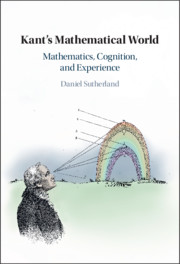Book contents
- Kant’s Mathematical World
- Kant’s Mathematical World
- Copyright page
- Dedication
- Contents
- Preface and Acknowledgments
- 1 Introduction
- Part I Mathematics, Magnitudes, and the Conditions of Experience
- 2 Space, Time, and Mathematics in the Critique of Pure Reason
- 3 Magnitudes, Mathematics, and Experience in the Axioms of Intuition
- 4 Extensive and Intensive Magnitudes and Continuity
- 5 Conceptual and Intuitive Representation
- Interlude The Greek Mathematical Tradition as Background to Kant
- Part II Kant’s Theory of Magnitudes, Intuition, and Measurement
- Bibliography
- Index
3 - Magnitudes, Mathematics, and Experience in the Axioms of Intuition
from Part I - Mathematics, Magnitudes, and the Conditions of Experience
Published online by Cambridge University Press: 21 October 2021
- Kant’s Mathematical World
- Kant’s Mathematical World
- Copyright page
- Dedication
- Contents
- Preface and Acknowledgments
- 1 Introduction
- Part I Mathematics, Magnitudes, and the Conditions of Experience
- 2 Space, Time, and Mathematics in the Critique of Pure Reason
- 3 Magnitudes, Mathematics, and Experience in the Axioms of Intuition
- 4 Extensive and Intensive Magnitudes and Continuity
- 5 Conceptual and Intuitive Representation
- Interlude The Greek Mathematical Tradition as Background to Kant
- Part II Kant’s Theory of Magnitudes, Intuition, and Measurement
- Bibliography
- Index
Summary
Chapter 3 provides a new interpretation of the Axioms of Intuition, which argues that all appearances and all intuitions are extensive magnitudes. Previous commentators have failed to understand the structure of the argument, which splits into twos: an argument that appearances and intuitions are magnitudes, and an argument that they are extensive magnitudes. The content of the first argument has also been misunderstood. It pivots on the definition of magnitude, which a prominent Kant scholar emended to help clarify the argument. Unfortunately, the emendation is misleading and obscures Kant’s views. This chapter provides a new analysis of Kant’s argument and his definition of magnitude that clarifies the relationship between the Axioms of Intuition and the categories of quantity and his understanding of magnitude. It reveals that Kant makes substantive claims about pure as well as applied mathematics and that he directly connects our cognition of magnitudes in pure mathematics to our cognition of the world. It also improves our understanding of two sorts of magnitude, quanta and quantitas. Most importantly, the improved interpretation points to a previously unrecognized role for intuition in representing magnitudes.
Keywords
- Type
- Chapter
- Information
- Kant's Mathematical WorldMathematics, Cognition, and Experience, pp. 58 - 86Publisher: Cambridge University PressPrint publication year: 2021

